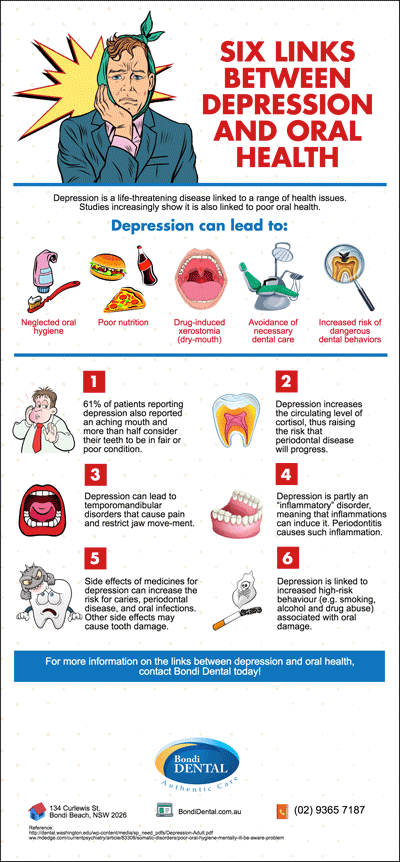Depression and Oral Health: Six Links Between Depression and Oral Health

Depression is a life-threatening disease linked to a range of health issues. Studies increasingly show that depression and oral health are also closely connected.
This link is often overlooked, but it can have a serious impact on your daily comfort, self-esteem, and long-term health. When depression affects your mood, motivation, and habits, it can also influence the way you care for your mouth.
In turn, oral health problems can affect your quality of life and may even make depression harder to manage.
Below are six important ways depression and oral health are connected — and why it’s worth paying attention to them.
1. Neglected Oral Hygiene
The condition of depression may be associated with the unwillingness to perform daily activities, such as brushing and flossing. This neglect can quickly result in plaque build-up, bad breath, cavities, and gum disease.
Without daily care, dental problems can progress faster than you might expect. Even if a full routine feels overwhelming, try brushing once a day and rinsing with water after meals to reduce bacteria build-up.
2. Poor Nutrition
Depression might make you lose your appetite or stimulate you to consume comfort food that contains much sugar and carbohydrates. These choices feed harmful bacteria in the mouth, leading to tooth decay and gum inflammation.
Poor nutrition also slows your body’s healing process, making it harder to recover from dental problems. Keep healthy snacks — such as cheese, nuts, or crisp vegetables — within easy reach to protect your teeth and boost your overall health.
3. Drug-Induced Xerostomia (Dry Mouth)
Most of the drugs prescribed to treat depression will have the effect of dry mouth or xerostomia. Saliva is essential for eliminating dietary residues, neutralising acid and preventing changes that lead to tooth decay.
Without enough saliva, you are more prone to cavities, gum disease, and oral infections. If you experience dry mouth, drink water regularly, chew sugar-free gum to stimulate saliva, and ask your dentist about protective fluoride treatments.
4. Avoidance of Necessary Dental Care
Feelings of fatigue, hopelessness, or anxiety associated with depression can make it difficult to schedule or attend dental appointments. Unfortunately, delaying treatment can turn small, easily fixable problems into painful and expensive issues.
Making an appointment may be too much to take up, so consider making an online booking or getting an assistant, e.g., someone you trust to make arrangements and accompany you on the visit.
5. Increased Risk of Dangerous Dental Behaviours
High-risk behaviours correlated with depression are smoking, alcohol and substance abuse, all of which may seriously affect oral health. The habits can cause tooth staining, gum inflammation, and a higher chance of tooth loss and oral cancer.
If you’re struggling with these behaviours, speak to your healthcare provider or a support service about healthier coping strategies.
6. Inflammation and Periodontal Disease
Depression raises the amount of cortisol, which is a stress hormone found in your blood; a person becomes prone to infection, including gum disease, and is not an exception. Depression is also partly an inflammatory disorder, meaning inflammation in the body — such as that caused by periodontitis — can contribute to or worsen depression.
Additionally, depression can lead to temporomandibular disorders (TMD) that cause pain and restrict jaw movement, further impacting oral function. Regular visits to a dentist and cleaning sessions can help control inflammation and prevent gum disease.

The Bigger Picture: Depression and Oral Health Go Both Ways
Research has shown that 61% of patients reporting depression also reported an aching mouth, and more than half considered their teeth to be in fair or poor condition. This isn’t just a coincidence — poor oral health can impact your self-image, make eating uncomfortable, and affect social interactions, all of which can feed into depressive symptoms.
Depression and the oral health relationship is a two-way road. By taking small steps to improve your dental care, you may also help improve your overall well-being.
Oral Health in Bondi Beach
If you’re struggling with depression, looking after your oral health may feel like just another challenge. But you don’t have to face it alone — your dental team can provide supportive, judgment-free care tailored to your needs.
At Bondi Dental, we understand how mental health can affect oral health and vice versa. Whether you’re due for a check-up or need treatment for a specific concern, we’re here to help you protect your smile and your well-being.
Call your Bondi dentist on (02) 9365 7187 or book your appointment online.
Visit us at 134 Curlewis St in Bondi Beach.
